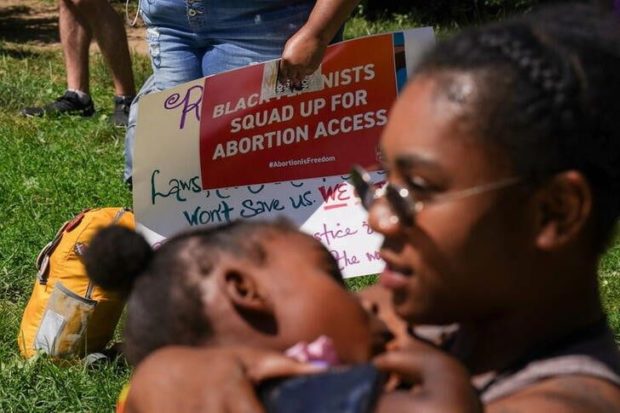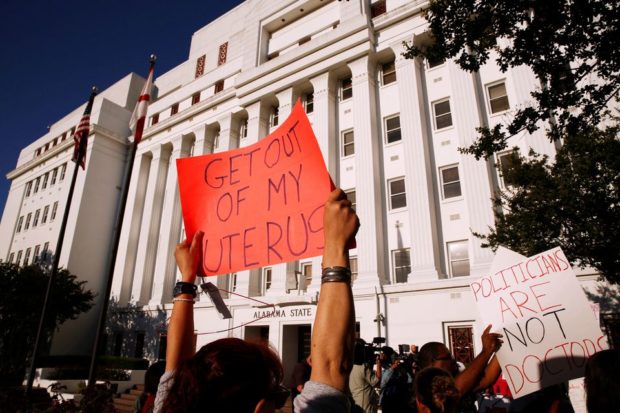Roe v Wade disproportionately hurts Black women, experts say

A person holds placards as Black Feminist Future and SisterSong: Women of Color Reproductive Justice Collective, accompanied by a range of civil rights and Black-led partner organizations, hold a “Black Bodies for Black Power” rally in Washington, U.S. June 18, 2022. REUTERS
WASHINGTON — The U.S. Supreme Court’s decision to overturn a constitutional right to an abortion is expected to have a disproportionate impact on Black women and other women of color, who have traditionally faced overwhelming costs and logistical obstacles in obtaining reproductive healthcare, experts said.
The reversal of Roe v Wade allows state governments to decide whether an abortion is legal. While some states have recently reaffirmed the right to an abortion, 26 states are likely or certain to ban abortion in most or all circumstances. read more
Advertisement · Scroll to continue
More Black women live in states that will likely ban abortion, and those living in southern states – with the most restrictive laws – will bear the brunt.
For example, Black people make up about 38% of Mississippi’s population, according to recent Census data, compared to about 13% of the U.S. population overall.
Black women in the United States are nearly four times more likely to have abortions than white women, while Latina women are twice as likely, according to 2019 data from the Centers for Disease Control and Prevention (CDC).
Advertisement · Scroll to continue
Health experts trace the relatively high rates of abortion among Black women to disparities in healthcare access, including lack of health insurance and contraceptives in underserved communities.
Article continues after this advertisementIn Mississippi, Black women accounted for 74% of abortions in 2019, according to the Kaiser Family Foundation.

Pro-choice supporters protest in front of the Alabama State House as Alabama state Senate votes on the strictest anti-abortion?bill in the United States at the Alabama Legislature in Montgomery, Alabama, U.S. May 14, 2019. REUTERS FILE PHOTO
“There is no denying the fact that this is a direct attack on all women, and Black women stand to be disproportionately impacted by the court’s egregious assault on basic human rights,” said Janette McCarthy Wallace, general counsel for the National Association for the Advancement of Colored People (NAACP).
If more Black women are forced to carry pregnancies to term, there will be a disproportionate increase in deaths of Black women in childbirth, a study published by Duke University Press finds.
More American women overall die of childbirth every year compared to any other developed nation, according to the White House. Black women are more than three times as likely to die from pregnancy-related complications as white women, data shared by the White House show.
A full abortion ban could further increase Black maternal deaths by 33%, compared to a 21% increase for the overall population, the Duke study found.
The Supreme Court ruling “marks the beginning of a new public health crisis for Black women,” said Michelle Webb, chief communications officer of the Black Women’s Health Imperative, a non-profit focused on improving the health of Black women.
U.S. Representative Cori Bush, who spoke about getting an abortion at 18, said “the attack on reproductive rights and abortion care is a public health emergency, and without action, it will further endanger the lives of our most marginalized communities.”
Long-term financial distress
Women who are forced to have an unwanted baby are more likely to be in poverty and experience financial distress for years afterward, with higher rates of evictions and bankruptcies, research including a 2020 paper published by the National Bureau of Economic Research shows.
When a woman is not able to obtain an abortion, the psychological impact of such an action hampers productivity, it said. Women also face medical costs associated with prenatal care, birth, postpartum recovery in addition to costs associated with raising a child that typically exceed $9,000 a year, the research showed.
“Abortion rights are economic rights,” said Heidi Shierholz, president of the Economic Policy Institute. “This decision means the loss of economic security, independence, and mobility for abortion seekers,” she said, which will impact women of color the most.
RELATED STORIES
U.S. Supreme Court overturns Roe v. Wade, curtailing abortion rights
Fresh protests as new US abortion reality takes shape
Biden administration signals fight over medication abortion
Abortion rights activists face first day of post-Roe v. Wade US life